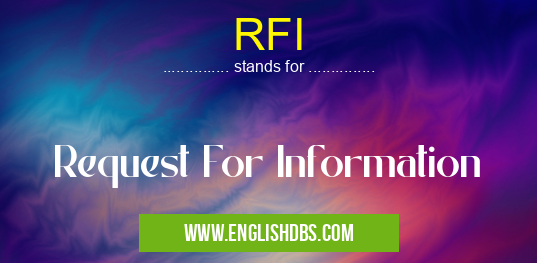What does RFI mean in GENERAL
RFI stands for Request For Information, a process used to collect data from potential suppliers and vendors. It is very important in the decision making process of selecting the best option for a particular need or requirement. RFI's help organizations make informed decisions based on detailed information provided by the various vendors they evaluate.

RFI meaning in General in Business
RFI mostly used in an acronym General in Category Business that means Request For Information
Shorthand: RFI,
Full Form: Request For Information
For more information of "Request For Information", see the section below.
What is RFI
RFI (Request For Information) is a formal process used to gather information from multiple sources in order to determine which option is the most suitable choice to fulfill a company's needs or requirements. A company will typically use an RFI document to get comprehensive background data on each vendor and any solutions or services they have available. This information can be invaluable when attempting to make an informed decision.
Advantages of Using RFI
Using an RFI can save both time and money for firms that are searching for their best solution. By gathering data upfront about potential vendors, companies can limit their search to only the providers that are qualified enough to meet their needs. This eliminates wasted time reviewing proposals from non-viable vendors who do not possess the features, capabilities, or cost savings necessary for consideration. Additionally, having this type of comparison between providers allows businesses to quickly identify weaknesses in individual solutions and upgrade them as needed before making a final selection.
Essential Questions and Answers on Request For Information in "BUSINESS»GENERALBUS"
What is a RFI?
A Request for Information (RFI) is a process used by organizations to gather written information about products or services from a variety of potential vendors. It effectively helps stakeholders understand the offerings available on the market and make an informed decision when selecting vendors.
When should I use an RFI?
An RFI should be used when your organization is looking to gain knowledge about different products or services, or when you want to better understand market trends and offerings. It can also help qualitatively or quantitatively assess vendors, depending on the goals of your project.
Who should be involved in the RFI process?
The primary stakeholders involved in an RFI process are Purchasing, Legal/Compliance, and Procurement teams. However, depending on the project scope and requirements, other stakeholders such as Finance, IT, Risk Management may need to be consulted as well.
How does an RFI compare to other procurement documents such as RFIs, RFQs and RFPs?
An RFI gathers information from potential vendors about their capabilities and offerings in advance of issuing a more formal solicitation document. An RFP (Request for Proposal) outlines specific requirements for solutions/products/services and solicits bids from multiple pre-qualified providers; while an RFQ (Request for Quotation) seeks pricing information from multiple providers that meet certain predetermined criteria.
What kind of information is typically included in an RFI?
An RFI includes questions that are related to vendor capabilities and solutions offered such as product descriptions, pricing models, customer references etc., that can help you evaluate the best options available before making a purchasing decision.
How long should it take to respond to an RFI?
The length of time it takes to respond to an RFI depends on the complexity of the questions asked and how much research needs to be done by the vendor prior submitting their response. Typically responses can range from 1-2 weeks up to several months depending on the situation at hand.
Can I request more time if I need it?
Yes - If you need more time than what was originally requested in order to fully respond to all parts of an RFI then, you can contact the buyer requesting additional time if this option is stated within the document itself.
Can I submit more information than what was requested in the original document?
Yes - You can submit additional information beyond what was initially specified if relevant materials or solutions are not mentioned in the initial request but could potentially benefit your company's objectives.
Final Words:
From providing detailed information about potential suppliers to allowing businesses to quickly identify weaknesses in individual solutions, RFI's are essential in helping organizations make better decisions when embarking on large projects or purchasing expensive goods/services. With this powerful tool at your disposal, you can rest assured that you have access to all the facts needed before signing off on any large purchases or investments!
